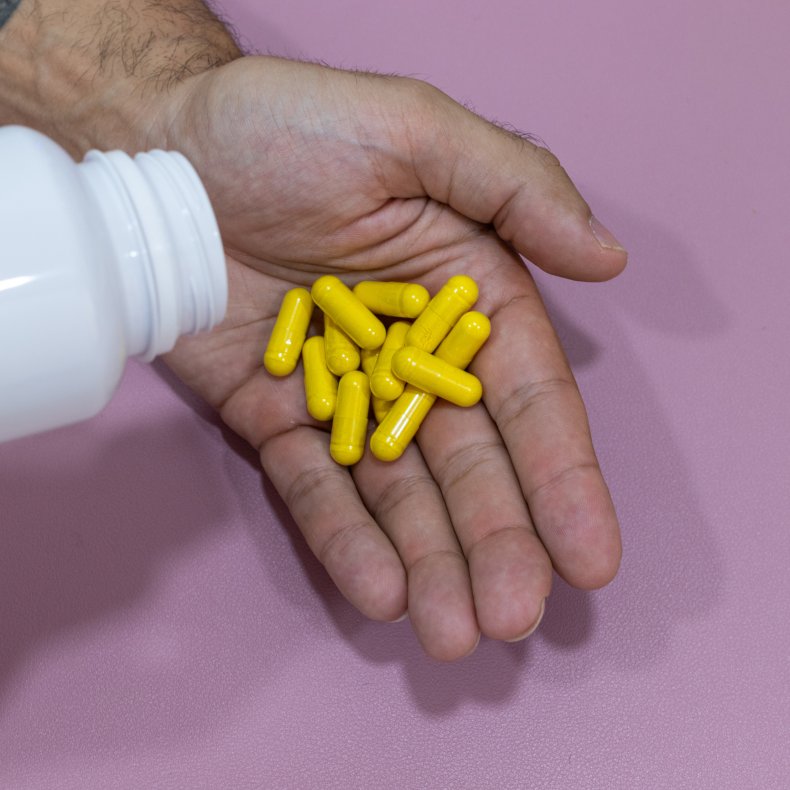A dietary supplement has become the hottest new weight loss trend. It’s been hailed by many as the “Ozempic of nature.” But what does berberine do to the body, and can it actually help you lose weight?
Berberine is a naturally occurring, bright yellow compound found in the roots of certain plants, like goldenseal and barberry. It has been used in traditional Chinese medicine for thousands of years to cure a range of ailments, from curing hemorrhoids to treating indigestion.
However, the ancient herb has been gaining momentum on social media, with a significant spike in Google searches since March 2023. Now, #berberine has more than 61.4 million views on TikTok, and thousands of users have taken to the app to share their experiences.
GlobalStock/Getty
What does berberine do for the body?
“There is good evidence that it reduces markers of overweight and obesity including reduced body weight, reduced body mass index, and induced weight circumference,” Tina Hinton, an associate professor of pharmacology at the University of Sydney, told Newsweek.
“Berberine has also been shown to help reduce blood glucose and other abnormal markers in type 2 diabetes, so it is known to be an anti-diabetic agent. It is also known to reduce cardiovascular, renal and neural complications of diabetes.”
The weight loss effects of berberine are thought to be controlled by its interaction with the enzyme AMP-activated protein kinase.
“[This enzyme] has a number of effects including increasing insulin secretion, which will help with lowering blood glucose levels, and reducing formation of fat cells,” Hinton said. “It also downregulates expression of other important proteins involved in formation of fat cells.”
Berberine has also been shown to increase the activity of the hormone glucagon-like peptide-1 (GLP-1), which plays an important role in regulating appetite and blood sugar levels.
“When activated after a meal, [GLP-1] tells your brain you’ve had enough to eat, and slows emptying of the stomach so you feel full longer,” Hinton said.
GLP-1 is the same hormone that is mimicked by drugs like Ozempic.

Gaston Ernesto Gonzalez Avila/Getty
Berberine vs. Ozempic
Ozempic is an injectable prescription drug that is used to manage blood sugar levels in patients with type 2 diabetes. It is based on an active ingredient called semaglutide, that mimics the structure of GLP-1 and activates its receptors.
“These agents are incredibly effective,” Dr. Sultan Linjawi, an endocrine and diabetes specialist, previously told Newsweek. “Clinical trials of these drugs have demonstrated really phenomenal diabetes improvements and typically, depending on the drug, 3 to 6 kilograms in weight loss in the context of the clinical trial.”
However, drugs like Ozempic are expensive, and has been increasingly hard to access due to increasingly rising demand. Therefore, many users have turned to the significantly cheaper, over-the-counter alternative, berberine.
How much berberine should you take?
“The research shows 300-3000 mg of berberine daily for at least three months will help with weight loss, so it is a matter of finding a supplement that contains enough berberine in that dose range,” Hinton said.
“Common supplements found on the shelves may contain smaller amounts of berberine (e.g. 100 mg, 500 mg) in a single tablet so you would need to follow directions and take a few tablets per day, or enough powder in powder form to reach 300-1000 mg berberine at least.”
If you have a medical condition, take any medication or are pregnant, you should always speak to your doctor before taking these supplements.

Kamonchai Mattakulphon/Getty
What are side effects of berberine?
Overall, berberine has been shown to have a fairly strong safety profile.
“Berberine appears to be really well tolerated with few significant side effects and does not appear to increase risk of development of other conditions through its use, at least based on the available evidence,” Hinton said.
The most significant reported side effects are mild nausea, abdominal bloating, diarrhea and constipation. But Hinton said that one of the main concerns with this supplement is how it can interact with other medications.
“The significant consideration with its use is its ability to interact with other herbal remedies and drugs in a number of ways,” she said. “One of these ways is by altering metabolism of some other drugs which may increase or decrease activity of these drugs and have adverse consequences.
“Another way it may interact with other medicines and herbal remedies is by doing the same thing those drugs do, so combining the effects may lead to, for example, even greater lowering of blood sugar levels, further reduction in blood pressure, increased sedative effects, etc.”
Over-the-counter supplements are also not subject to the same level of FDA scrutiny as licensed medications, which means it is hard to guarantee the dosage and quality of the product.
If you are interested in experimenting berberine, it is recommended that you speak to a medical professional before taking supplements.
Is there a health issue that’s worrying you? Do you have a question about weight loss drugs? Let us know via [email protected]. We can ask experts for advice, and your story could be featured on Newsweek.


